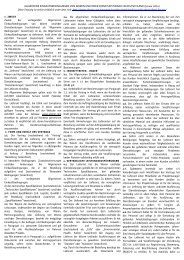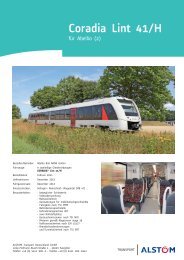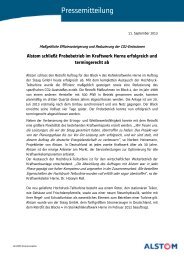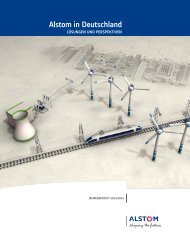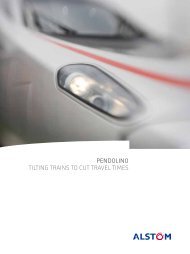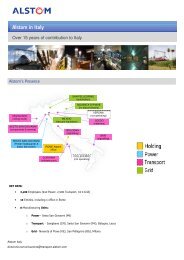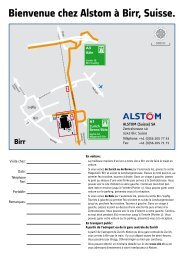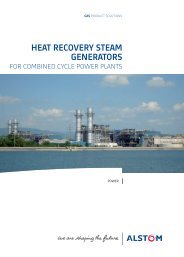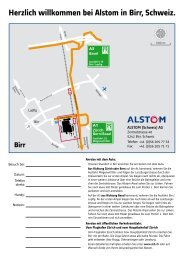MOROCCO IS ACCELERATING! feature - Alstom
MOROCCO IS ACCELERATING! feature - Alstom
MOROCCO IS ACCELERATING! feature - Alstom
You also want an ePaper? Increase the reach of your titles
YUMPU automatically turns print PDFs into web optimized ePapers that Google loves.
70<br />
guest<br />
Prizes and distinctions<br />
�<br />
Economics<br />
Prix Laplace 1933 and Prix Rivot<br />
from the Académie des sciences<br />
for his passing out rank (n°1)<br />
at the École polytechnique.<br />
Prix Charles Dupin from<br />
the Académie des sciences<br />
morales et politiques (1954).<br />
Lanchester Prize from the Johns<br />
Hopkins University and<br />
the Operations Research Society of<br />
America (1958).<br />
Prix Joseph Dutens from<br />
the Académie des sciences<br />
morales et politiques (1959).<br />
Prix Robert Blanché from<br />
the Académie des sciences<br />
morales et Politiques (1983).<br />
Grand prix Guido Zerilli Marimo<br />
from the Académie des sciences<br />
morales et politiques (1984).<br />
Special jury prize, on the occasion<br />
of the creation of the Prix Dupuitde-Lesseps<br />
(1987).<br />
Nobel Prize for Economics (1988).<br />
Physics<br />
Prix Galabert from the Société<br />
française d’astronautique (1959).<br />
Laureate of the Gravity Research<br />
Foundation, 1959, USA.<br />
Passenger: how to estimate the cost of<br />
a journey for a passenger boarding a train at<br />
Calais station to travel to Paris? This ‘paradox’<br />
is only one in the sense which is given to it by<br />
decision theory. It evokes the diffi culty<br />
of determining the price of a passenger’s train<br />
ticket from an estimation of its marginal cost.<br />
The problem is as follows. As soon as there<br />
is at least one passenger on board a train,<br />
the train has to leave. A passenger in Calais<br />
goes to the station. He wishes to travel<br />
to Paris. He boards the train leaving<br />
for the capital, but he has not yet bought his<br />
ticket. He notices that there are people<br />
in the compartment and he waits. Just before<br />
the departure of the train, he observes<br />
that several seats remain unoccupied.<br />
He sits down in one of these. When the ticket<br />
inspector passes and asks him to show his<br />
ticket, he argues that the train was anyway<br />
obliged to leave once a passenger had<br />
boarded it, and that it costs the transport<br />
company no more to run the train when<br />
it is full than when there are only one<br />
or two people aboard. Consequently, as his<br />
presence on board does not change<br />
the situation, there is no justifi cation in asking<br />
him to pay for a ticket. In conclusion, of<br />
all the passengers present on board the train,<br />
the only one who should pay for his ticket<br />
is the fi rst to have boarded the trainset…<br />
The paradox is resolved by employing<br />
the concept of marginal development cost.<br />
If the train is not full, the cost generated by<br />
the presence of this additional passenger<br />
can correspond to the price of the additional<br />
energy consumed to transport him,<br />
the cleaning and ticket inspection costs<br />
that he personally generates, as well as<br />
the additional wear caused to equipment.<br />
These costs will a priori be low.<br />
If however the train is full, this passenger<br />
necessitates the mobilisation of an additional<br />
car… If the maximum number of cars<br />
that can be towed by the locomotive or that<br />
can be received by platforms has already<br />
been reached, this additional passenger<br />
requires putting into service a second train…<br />
If the Calais-Paris line is saturated<br />
by the existing trains, the operator is then<br />
obliged to build a second line…<br />
The same event cannot therefore be<br />
assessed in the same way if<br />
the circumstances in which it occurs and<br />
the type of decision that it generates, vary.<br />
According to the availability or not of<br />
various resources (cars, trains or lines…),<br />
the appraisal of the costs generated by<br />
this additional passenger will differ according<br />
to whether they are assessed by the ticket<br />
inspector, the guard, the line manager<br />
or the network director.<br />
The answer proposed by Maurice Allais is<br />
based on the mode of addition of these costs,<br />
in response to the points of view of<br />
the different economic actors whose analyses<br />
then become complementary. Therefore,<br />
the decision is also the responsibility of<br />
the additional passenger: if his late arrival<br />
obliges mobilisation of additional physical<br />
resources such as a car or a train,<br />
the price at marginal cost indicates to him<br />
the enormous weight which he is going to be<br />
imposing on everyone, whether this be for<br />
other passengers or for the entire community.<br />
Faced by the true fi nancial cost of his wish<br />
to board the train, he can decide knowingly<br />
to maintain his choice or to wait for a following<br />
train – which will be less expensive.<br />
Pricing at marginal cost therefore sends<br />
an ‘economic signal’ to each consumer<br />
and each actor, and helps them to adopt<br />
more rational behaviour with regard<br />
to scarce resources.



